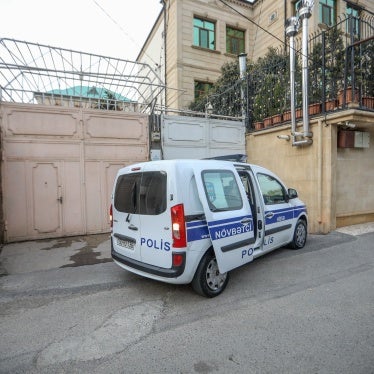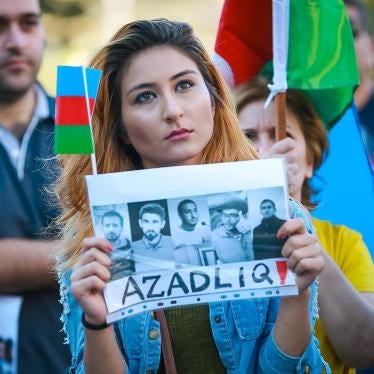(Berlin) – The Azerbaijani government escalated its repression against its critics in 2014, with a dramatic deterioration in its already poor rights record, Human Rights Watch said today in its World Report 2015.
Azerbaijani authorities arrested or convicted dozens of people during the year on bogus charges, including leading human rights defenders and journalists, froze the bank accounts of independent civic groups and their leaders, denied them access to funds by refusing to register foreign grants, and adopted legislation that further limited the work of independent groups. The crackdown continued even as Azerbaijan held the rotating chairmanship of the Committee of Ministers of the Council of Europe, Europe’s foremost human rights body. The Azerbaijani government should free everyone held on politically motivated charges and end its crackdown.
“In the past year, Azerbaijan’s government intensified a systematic crackdown on human rights defenders and others critics,” said Giorgi Gogia, senior South Caucasus researcher at Human Rights Watch. “Azerbaijan’s role within the Council of Europe was a sad charade with increased repression against domestic critics, and this needs to end.”
In the 656-page world report, its 25th edition, Human Rights Watch reviews human rights practices in more than 90 countries. In his introductory essay, Executive Director Kenneth Roth urges governments to recognize that human rights offer an effective moral guide in turbulent times, and that violating rights can spark or aggravate serious security challenges. The short-term gains of undermining core values of freedom and non-discrimination are rarely worth the long-term price.
Instead of using its leadership role in the Council of Europe to address longstanding human rights concerns at home, the government lashed out at its critics with spurious criminal charges and convictions. The authorities used a range of bogus charges, including narcotics and weapons possession, tax evasion, hooliganism, incitement, and even treason, to convict or imprison at least 34 human rights defenders, political and civil activists, journalists, and bloggers, prompting others to flee the country or go into hiding. On December 29 President Ilham Aliyev pardoned a handful of individuals who had been convicted on politically motivated charges, but dozens more remained behind bars.
Among those imprisoned are several Azerbaijani human rights leaders such as Leyla Yunus, director of the Institute for Peace and Democracy, and her husband, Arif Yunus, arrested in July and August, respectively, and charged with treason, tax evasion, and illegal entrepreneurship. Those held also include Rasul Jafarov, Human Rights Club director, and Intigam Aliyev, head of the Legal Education Society – both arrested in August and charged with tax evasion, illegal entrepreneurship, and abuse of authority. In December, the authorities arrested Khadija Ismayilova, Azerbaijan’s leading investigative journalist and ardent government critic, on spurious charges of driving someone to attempt suicide. All remain in pretrial custody. Also in December, police and prosecutors raided the office of Radio Free Europe/Radio Liberty in Baku, questioned employees, seized equipment and files, and sealed off the premises.
The authorities also initiated legislative changes further restricting work of independent groups. In November President Ilham Aliyev signed into law amendments requiring government licensing of all foreign donors and approval of each funded project by the relevant authorities, practically cutting off all funding opportunities for groups that criticize the government.
Azerbaijan’s international partners have criticized Baku for its increasing crackdown but have not made full use of the leverage of their relationships with the government to secure rights improvements.
“Azerbaijan’s brutal silencing of its critics showed sheer contempt for the Council of Europe and everything it stands for,” Gogia said. “The Council of Europe and Baku’s other international partners should make clear that such behavior is unacceptable and call for immediate release of those imprisoned on politically motivated charges.”







